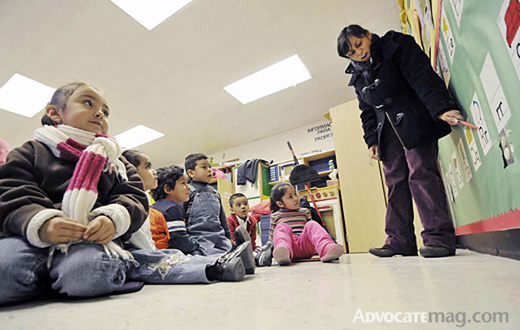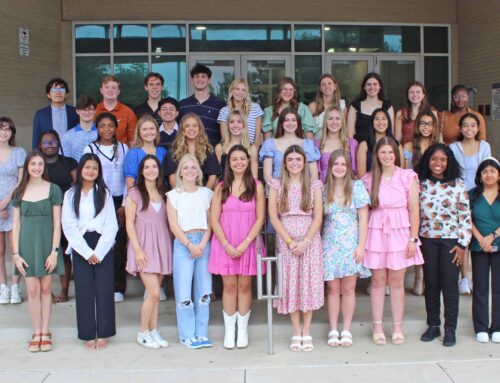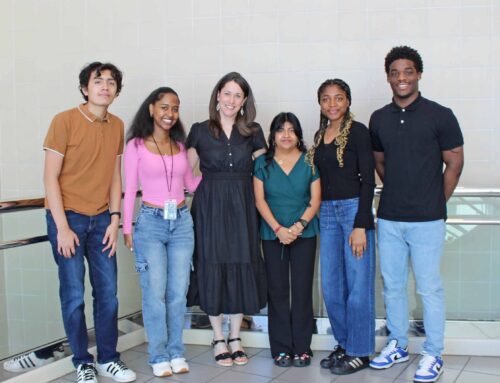For years, Paula Sanchez’s unrelenting worries about feeding and clothing her family, coupled with concern over dangers of daily life in one of Dallas’ most violent neighborhoods, prevented her from treasuring time with her children.
The young mother’s neighborhood, Vickery Meadow, flanks our own, but the 2.86-square-mile area with its almost 18,000 apartment homes can seem to Lake Highlands homeowners like a different world.
At least 20 different languages are spoken among the 36,000 Vickery Meadow residents. It is one of the most densely populated, ethnically diverse and lowest-income areas of Dallas, according to statistics provided by the Vickery Meadow Improvement District, which formed in 1993 in an effort to curb crime. The average income is $24,000 and average family size is 5.3 persons.
In February 2009, Dallas Police pinpointed Vickery Meadow the violent-crime capital of Dallas, reporting more than 350 rapes, assaults or murders for 2008.
For 18 years, the improvement district has been working to increase the quality of life for the residents by partnering with Dallas Police and city officials, hiring off-duty officers to patrol the area, and implementing interactive policing programs that involve apartment owners.
As the VMID continues to build a healthier and safer environment for renters (crime is down 52 percent since it formed and down 6 percent since 2008, according to Dallas Police statistics) complementary groups, such as the Vickery Meadow Youth Development Foundation, are reaching the heart of the neighborhood — children and their parents — in an effort to heal the community at its core.
Martha Stowe, executive director of the VMYDF who is also on the VMID board, says she tries to meet the most pressing needs of the children in Vickery Meadow, specifically through education and enrichment programs.
“We work closely with the schools that serve the neighborhood, assess the greatest needs, and try to put the best programs in place to meet those needs.”
One such program is Avance, a group that works with elementary schools serving at-risk families — that’s the one that changed the lives of Sanchez, the 24-year-old mother, and her three children.
“The most important thing I learned in Avance is that I am my child’s first teacher,” Sanchez says, “and that you only have one life to enjoy time with your children. Now we spend time together. I read to them. I never used to do that. I realize now that they need me.”
Another mom, Maria Martinez, says her children, ages 5 and 3, once only seemed to compound life’s pressures.
“I used to get annoyed when they asked me questions,” she says through an interpreter. “Now I take time to answer every question.”
Sanchez and Martinez are among 30 or so moms of elementary- and preschool-age children who gather Tuesdays from 8:30 to 11 a.m. at Hotchkiss Elementary (a Dallas ISD school located just a mile from White Rock Elementary) to learn how to be better parents.
On the day following Christmas break, the Avance moms sew pillows for their children. Sanchez says she’s learned to handcraft gifts for her children. Meanwhile, the young children are in preschool at nearby portable buildings. One major problem in the Vickery Meadow area, Stowe says, is the lack of preschools. “Research shows that brain development begins in early childhood,” she says. “So (if they don’t go to preschool) when they enter kindergarten or first grade, they are already at a disadvantage.”
Nearby, Vickery Meadow Learning Center’s Family English Literacy program provides preschool for children of the center’s adult students.
Lake Highlands resident Liz Luthans, who works in the oil industry by day, says her volunteer teaching assignment at the Vickery Meadow Learning Center is the highlight of every week.
“The students are hardworking, gracious and appreciative,” she says. “Many of them come to my night class following a day of hard work — cleaning houses, working construction jobs. They want to learn to communicate with their children’s teachers, and to get better jobs and build a better life. They are dedicated.”
They are a diverse group of students whose native tongues are varied.
“When I first started about four years ago, the students were predominately Spanish speaking,” Luthans says. “Now we have students from Burma, Iran, Peru … there are two brothers from the Congo and French-speaking African natives. Many of them are refugees.”
English is the only language spoken in the VMLC classroom. In addition to learning English and grammar, Luthans says, students learn about things such as health issues and American culture, “and I learn about their culture.”
She says that in Mexico the government funds public education only through the sixth-grade.
“Did you know that? Most people don’t know that.”
As a by-product, educational and enrichment programs move members of Vickery Meadow to interact with and support one another, Stowe notes. Mothers who traditionally kept to themselves will work together on behalf of their children, she says.
Sanchez says that’s true in her case.
“I used to be a solo person, doing everything alone, but when I met the other moms in Avance, we began going shopping together, supporting each other. This experience has shown me that other people go through the same things as me, and that there are people who really do care about us.”
For adolescent-aged students, the Vickery Meadow Youth Development Foundation started the Eagle Scholars program, which aims to get students from Vickery Meadow to college. Through a partnership with Southern Methodist University, 120 middle school students spend five weeks each summer at SMU’s Simmons School of Education and Human Development.
“They take a lot of pride in being on a university campus,” Stowe says.
To date, VMYDF has sent 16 Vickery Meadow youth who attended Conrad High School to college on scholarships.
“So far, they are all doing well — haven’t had one drop out yet,” Stowe says.
It takes time, but through the various programs, Vickery Meadow is becoming a better community, Stowe says.
Lake Highlands homeowners have an opportunity to help improve the lives of Vickery Meadow families — not just an opportunity, stresses Vickery Meadow Learning Center teacher Liz Luthans, but an obligation.
“They are our neighbors,” she says, “yet some [Lake Highlands residents] are afraid to even drive through Vickery Meadow. I live by the belief that if you ‘teach a man to fish, he can eat forever’.”
The payoff for volunteering,” she says, “is far greater than the effort exerted constructing a lesson plan and teaching once a week.
“To watch them progress is such a reward. Most of us who teach here aren’t teachers for a living, but this is how teachers must feel … it uplifts me for the whole week,” she says. “I consider the center my neighbor, and a great one to have.”
Volunteer opportunities
Vickery Meadow Learning Center: Amy Glover at 214.265.5057 ext. 12
Vickery Meadow Improvement District: 214.265.8285 or vickerymeadow.org
Vickery Meadow Youth Development Foundation: Martha Stowe 214.443.7985
Eagle Scholars: Sherril English at 214.768.8402, or shenglish@smu.edu
Avance: Anne Thomas at 214.887.9907, ext. 115, or athomas.dal@avance.org






